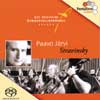Stravinsky Orchestral Works
Poised and civilised playing, certainly, but in the raw world of Stravinsky’s music?
View record and artist detailsRecord and Artist Details
Composer or Director: Igor Stravinsky
Label: Pentatone
Magazine Review Date: 8/2004
Media Format: Super Audio CD
Media Runtime: 73
Mastering:
Stereo
DDD
Catalogue Number: PTC5186046

Tracks:
| Composition | Artist Credit |
|---|---|
| (L') Histoire du soldat |
Igor Stravinsky, Composer
Deutsche Kammerphilharmonie, Bremen Igor Stravinsky, Composer Paavo Järvi, Conductor |
| Rag-time |
Igor Stravinsky, Composer
Deutsche Kammerphilharmonie, Bremen Igor Stravinsky, Composer Paavo Järvi, Conductor |
| Concerto in E flat, 'Dumbarton Oaks' |
Igor Stravinsky, Composer
Deutsche Kammerphilharmonie, Bremen Igor Stravinsky, Composer Paavo Järvi, Conductor |
| Concerto |
Igor Stravinsky, Composer
Deutsche Kammerphilharmonie, Bremen Igor Stravinsky, Composer Paavo Järvi, Conductor |
Author: Arnold Whittall
It’s debatable whether the market is crying out for another collection of Stravinsky miniatures, and although the Deutsche Kammerphilharmonie are always worth hearing, there are signs here that they are less at home in this often abrasive music than in other areas of the repertory.
The Concerto in D for strings comes off best. This is a score in which poise is of the essence, the spirit of the music-hall is kept at bay, and that ultra-Stravinskian combination of nervy rhythms and sweet-sour harmonies is finely realised in this performance. The same should be true of Dumbarton Oaks, but Paavo Järvi’s tempi are just that bit too broad for a suitably sprung rhythm, and the recorded sound is insufficiently string-centred to do justice to the music’s edgily balanced textures. The short Rag-time for 11 instruments benefits from Järvi’s relatively weighty approach, but the two Suites need more punch: applying this to riotous effect in the final ‘Polka’ of No 2 simply underlines its absence earlier on.
L’Histoire du Soldat is not exactly a miniature, but its succession of short numbers works best in the concert hall when the eight-movement suite is played. A ‘suite’ is what we are offered here, but Järvi includes the ‘Petit airs’ and ‘Pastorale’ movements which Stravinsky’s own suite omitted – they are, frankly, rather dull when removed from their dramatic context – and he also adds the 40-second ‘Petit choral’, placing it between Rag-time and Dumbarton Oaks rather than within the performance of L’Histoire itself. None of this would matter if the performance took fire, but these excellent players are simply too civilised for such raw and sardonic music.
The Concerto in D for strings comes off best. This is a score in which poise is of the essence, the spirit of the music-hall is kept at bay, and that ultra-Stravinskian combination of nervy rhythms and sweet-sour harmonies is finely realised in this performance. The same should be true of Dumbarton Oaks, but Paavo Järvi’s tempi are just that bit too broad for a suitably sprung rhythm, and the recorded sound is insufficiently string-centred to do justice to the music’s edgily balanced textures. The short Rag-time for 11 instruments benefits from Järvi’s relatively weighty approach, but the two Suites need more punch: applying this to riotous effect in the final ‘Polka’ of No 2 simply underlines its absence earlier on.
L’Histoire du Soldat is not exactly a miniature, but its succession of short numbers works best in the concert hall when the eight-movement suite is played. A ‘suite’ is what we are offered here, but Järvi includes the ‘Petit airs’ and ‘Pastorale’ movements which Stravinsky’s own suite omitted – they are, frankly, rather dull when removed from their dramatic context – and he also adds the 40-second ‘Petit choral’, placing it between Rag-time and Dumbarton Oaks rather than within the performance of L’Histoire itself. None of this would matter if the performance took fire, but these excellent players are simply too civilised for such raw and sardonic music.
Discover the world's largest classical music catalogue with Presto Music.

Gramophone Digital Club
- Digital Edition
- Digital Archive
- Reviews Database
- Full website access
From £8.75 / month
Subscribe
Gramophone Full Club
- Print Edition
- Digital Edition
- Digital Archive
- Reviews Database
- Full website access
From £11.00 / month
Subscribe
If you are a library, university or other organisation that would be interested in an institutional subscription to Gramophone please click here for further information.




